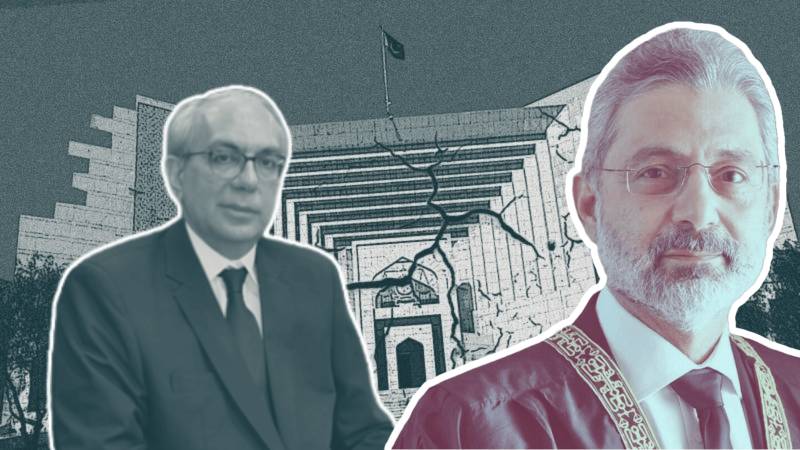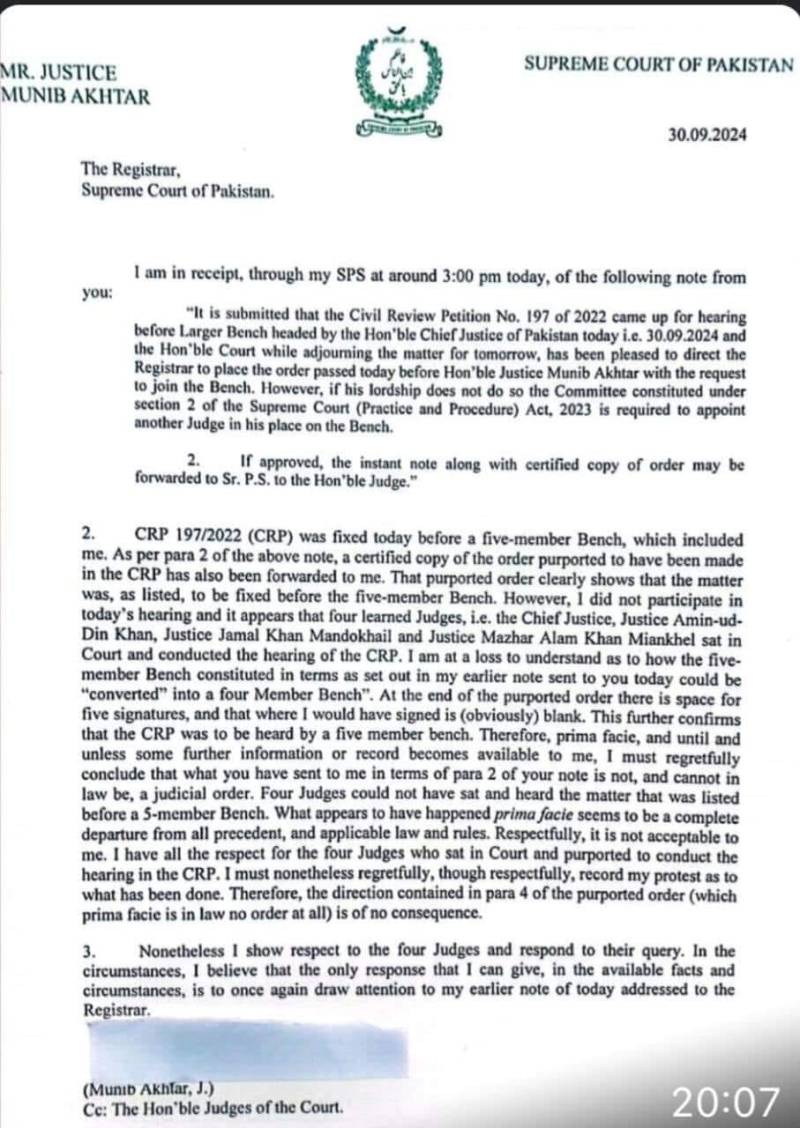
The hearing of an important review petition in the Supreme Court on Monday descended into drama as a key judge missed the hearing, and undercurrents emerged in the official communique, which hinted at a deepening rift between the top judge and a senior judge of the court.
The hearing for a review petition on Article 63-A was set for Monday but was adjourned until Tuesday after one member of the five-judge larger bench, Justice Munib Akhtar, did not attend proceedings.
Justice Akhtar was the author of the main judgment on the Presidential Reference on Article 63-A, wherein he had ruled that if a lawmaker casts a vote against the directions of the respective Parliamentary party leader, that vote shall not be counted. With his verdict now under review, his participation on the bench is key.
Justice Akhtar's decision not to join the bench comes against the backdrop of his removal from the three-judge bench-fixing committee established under the Supreme Court (Practice and Procedure) Act 2023, after the promulgation of a Presidential ordinance that amended the law and granted the chief justice powers to select any judge of the top court as the committee's third member.
The much-awaited review petition had been fixed for hearing on Monday before a five-member larger bench headed by Chief Justice Qazi Faez Isa. Other members of the bench included Justice Akhtar, Justice Aminud Din Khan, Justice Jamal Khan Mandokhail and Justice Mazhar Alam Miankhel.
At the allotted hour, four judges assembled in the courtroom. But Justice Akhtar's seat remained vacant.
Later, it emerged that Justice Akhtar had written to the Supreme Court registrar with directions to place a copy of the letter on record, wherein he explained his absence. He concluded his letter by stating: "I must express my inability, at the present time, to be part of the bench constituted to hear the CRP. It may be noted that this is not a recusal, and my present inability should not be misconstrued or misinterpreted as such."
Court hearing
During Monday's proceeding, Chief Justice Isa noted that Justice Akhtar's May 17, 2022, verdict had been announced by a five-member bench. He added that a review against that judgement had been pending for over two years. He termed the review against Article 63-A a matter of an important nature.
Chief Justice Isa then proceeded to read Justice Akhtar's letter aloud and quoted him on why he could not join the bench.
However, at the same time, CJP Isa said Justice Akhtar had clarified that he was not recusing from being a part of the bench and that his absence should not be misconstrued. The chief justice proceeded to quote Justice Akhtar's request to make his letter a part of the record of the review case.
Rejecting Justice Akhtar's request to put his letter on the record in the case, the top judge observed that no such precedence existed.
Chief Justice Isa -- who chose to replace Justice Akhtar on the three-judge bench-fixing committee last week just hours after a Presidential ordinance amended the Supreme Court Practice And Procedure Act 2023 -- further said that it would have been better had Justice Akhtar voiced his opinion before the three-judge committee.
"I (chief justice) have always encouraged differing views."
The top judge asserted that he respected Justice Akhtar's opinion and that once the bench had been formed, a judge could only recuse themselves from a case only in the courtroom.
During the hearing, Additional Attorney General Aamir Rehman pointed out that Mansoor Usman Awan, who was representing the Supreme Court Bar Association (SCBA) when the original case was decided, is currently the Attorney-General for Pakistan, therefore, he will be representing the federation of Pakistan. The incumbent and the then-presidents of the SCBA confirmed the matter.
PTI's counsel, Barrister Ali Zafar, informed the court that once documentary formalities are completed, he will likely represent former prime minister and PTI founder Imran Khan, since he had filed a petition. The court allowed Barrister Zafar to represent Imran Khan.
Ultimatum to join
A two-page written order issued after Monday's proceedings were adjourned stated that Justice Akhtar, who headed Bench No. III and conducted cases on Monday, adding, "We were together in the judge's tea room."
"Therefore, we direct the registrar to place before his lordship the instant order with the request to his lordship to join the bench."
"However, if his lordship does not do so, the committee constituted under section 2 of the Supreme Court (Practice and Procedure) Act 2023, is required to appoint another judge in his place on the bench," it added.
Justice Akhtar rejects order
Responding to the order issued by the four judges of the five-member bench where Justice Akhtar was asked to either join the bench or the bench-fixing committee would be forced to replace him, the senior judge said the order was not acceptable and questioned its legality.
"Until and unless some further information or record becomes available to me, I must regretfully conclude that what you have sent to me in terms of para 2 of your note is not, and cannot in law be, a judicial order," he contended in a letter to the registrar, adding, "Four Judges could not have sat and heard the matter that was listed before a five-member bench."
"What appears to have happened prima facie seems to be a complete departure from all precedent and applicable law and rules."
He added that the order showed that a five-member bench was due to hear the matter and issue an order, yet the issued order only contained four signatures. "I am at a loss to understand as to how the five-member bench constituted in terms as set out in my earlier note sent to you today could be "converted" into a four-member bench."
While he expressed respect for the four judges who sat to conduct the hearing, he did not agree with what was done.
"Respectfully, it is not acceptable to me," he said, adding, "I must nonetheless regretfully, though respectfully, record my protest as to what has been done."
"Therefore, the direction contained in para four of the purported order (which prima facie is in law no order at all) is of no consequence."
He said that his only response to the query posed by his brother judges was the same as his earlier letter to the registrar.

No official authority?
Lawyer and senior Pakistan Tehreek-e-Insaf (PTI) leader Fawad Chaudhry termed the order as Functus officio (no further official authority) as one judge did not attend the sitting. Noting that since the bench was incomplete in the absence of a judge, how could the remaining members have passed a judicial order?
He further said that Chief Justice Qazi Faez Isa must not play with the law and the rules of the top court.
Another senior lawyer, Advocate Mian Daud, negated Chaudhry's stance and questioned what rule mandated that if a judge of the bench does not participate on the bench, the judges can rise without passing any order.
"What if only 'Adjourned for tomorrow' was written, wouldn't that be a judicial order," questioned Advocate Daud.
Legal experts believe that it would have been more appropriate had the matter been discussed in the minutes of the three-judge bench-fixing committee meeting instead of through a judicial order. They said such an exchange is unprecedented, adding that ideally, Justice Akhtar should have joined the bench before recusing himself and expressing his reservations.
Justice Shah's protest
Supreme Court's senior puisne judge, Justice Mansoor Ali Shah, a member of the three-judge committee, had expressed reservations about the Ordinance and replacing Justice Akhtar with Justice Aminud Din Khan on the committee. He refused to attend the committee's meeting to protest Justice Akhtar's removal.
CJP Isa responded to Justice Shah's actions by briefly discussing the issue and explaining Justice Ameen Uddin's inclusion owing to Justice Yahya Afridi's unavailability to be included in the committee. CJP also offered several reasons for excluding Justice Akhtar from the committee, listing a charge sheet that included fully utilising his summer vacations despite a swelling backlog of cases while insisting on attending committee meetings.

